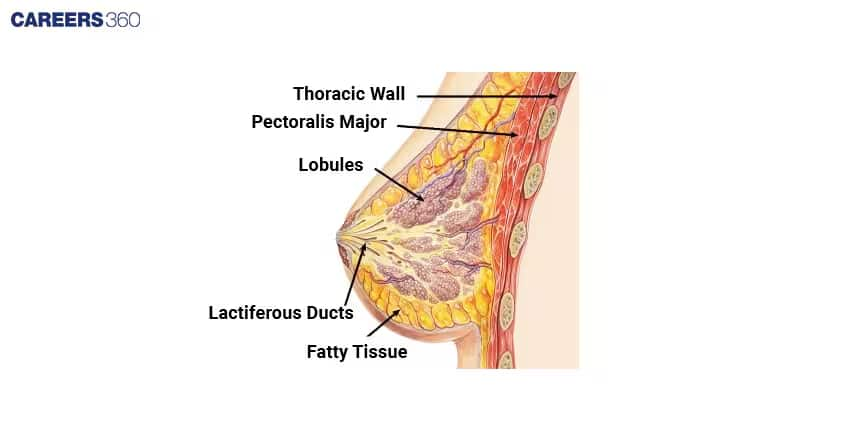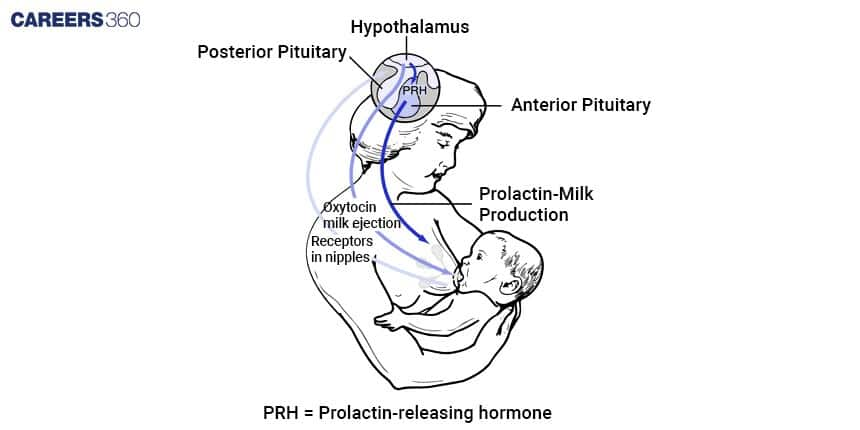Lactation: Definition, Lactation Process, Lactation Hormones
Lactation refers to the process by which milk is produced within the mother's body for the nourishment of her infant. It occurs after the delivery of a child and provides the baby with the necessary nutrients and antibodies for growth and health. Lactation is an important topic in the Class 12 chapter Human Reproduction in Biology. Understanding lactation helps students learn how the reproductive system supports both infant development and the mother's health.
NEET 2025: Mock Test Series | Syllabus | High Scoring Topics | PYQs
NEET Important PYQ's Subject wise: Physics | Chemistry | Biology
New: Meet Careers360 B.Tech/NEET Experts in your City | Book your Seat now
- What is Lactation?
- Lactation Preparation
- Lactation Process
- Hormones of Lactation
- What is the Lactation Period?
- Can Lactation Happen in the Absence of Pregnancy?
- Challenges of Lactation
- Recommended video on Lactation

What is Lactation?
Lactation is the production and secretion of milk from the mammary glands of mammals after parturition. Besides providing nutrition, lactation confers immunological protection to neonates owing to the presence of several antibodies in breast milk. The initiation of lactation is mainly due to hormonal changes during and at the end of pregnancy, particularly by the fall in progesterone and the increase in prolactin and oxytocin.
Lactation Preparation
Mammary glands in the body undergo severe changes during pregnancy in preparing for lactation.
At about the fifth or sixth month of pregnancy, the glands begin producing colostrum, a very nutritious fluid representing the first milk to which newborns are exposed.
Colostrum contains high amounts of immunoglobulin A, which is very crucial in the development of the newborn's immune system.

Lactation Process
Lactation refers to milk secretion from the mammary glands.
Following parturition, the hormonal environment changes to permit an increase in milk production.
The stimulus to breastfeed, in turn, causes the release of oxytocin, which then causes the ejection of milk from the alveoli into the ducts where it is now available to the infant.

Hormones of Lactation
Several hormones have key roles in lactation:
Prolactin: This hormone triggers the production of milk in the alveoli.
Oxytocin: This hormone enables milk ejection reflex and enables milk to reach the nipple.
Estrogen and Progesterone: These are hormones that prepare the breasts to be able to lactate during pregnancy; however, they also inhibit milk production until delivery has occurred.
What is the Lactation Period?
It is the period when a mother starts producing milk for feeding her newborn. It sets in after childbirth since the hormonal changes at these periods mainly through prolactin and oxytocin stimulate milk production.
This period of lactation in humans varies widely due to personal choice and other cultural practices, from a few months to several years, although exclusive breastfeeding is often recommended until six months.
Can Lactation Happen in the Absence of Pregnancy?
Yes, this can also occur with lactation in non-pregnant individuals due to several reasons such as hormonal imbalance or even effects from some medications.
This may be from diseases like hyperprolactinemia, whereby too much prolactin is secreted thus stimulating milk production even when one is not pregnant.
Physical Properties of Milk
The composition changes over time.
The milk present right after birth is colostrum.
A few weeks after delivery, mature milk starts coming out.
Mature milk contains the right proportions of all the nutrients that are needed by the child including fats, proteins and carbohydrates for healthy growth and development of the infant.
Advantages of Breast Feeding
Some of the advantages of breastfeeding feeding both for the mother and the baby are
In babies, it offers the best nutrition and enhances the immunity of the baby, which in turn diminishes the possibility of developing or catching any kind of infections, besides other serious chronic diseases.
In mothers, it makes one heal well after birth and reduces the risk of developing certain cancers like cancer in the breast and ovaries.
Challenges of Lactation
Even though breastfeeding is very advantageous, there exist several challenges that most mothers go through in breastfeeding, such as;
Poor supply of milk.
Very painful breastfeeding.
Social pressures/lack of support
Weaning and Cessation of Lactation
Weaning is the gradual withdrawal of the baby from breast milk toward solid foods.
This process may vary significantly across cultures and people. When milk demand decreases, lactation slows naturally.
Importance of Support for Lactating Women
The support a breastfeeding mother receives from the health care provider, family, and community goes a long way to a mother's success with this practice. Much education regarding technique and troubleshooting often resolves many issues.
Also Read:
| Male Reproductive System | Placenta |
| Disorders of Reproductive System | Fate of Germ Layers |
| Implantation | Blastocyst |
Recommended video on Lactation
Frequently Asked Questions (FAQs)
Colostrum is the first milk after birth, which is dense in antibodies and nutrients for the establishment of the newborn's immune system.
The World Health Organization recommends that babies be exclusively breastfed for up to six months, with continued breastfeeding along with appropriate complementary solid foods for up to two years or longer.
Most mothers who have cesarean sections can successfully breastfeed. Though they may need more support at first.
Call a health care provider or a lactation consultant for advice and help in stimulating milk supply.
Almost all mothers can breastfeed. However, there are a few medical conditions and some medicines for which the mother needs to consult her health care provider first for safety both for herself and the baby.
Also Read
09 Nov'24 02:37 PM
22 Oct'24 06:17 PM
18 Sep'24 06:37 PM
18 Sep'24 06:04 PM
18 Sep'24 05:27 PM
18 Sep'24 05:21 PM
18 Sep'24 05:20 PM
29 Aug'24 12:07 PM